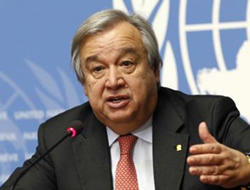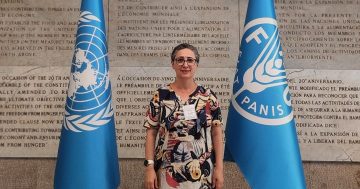UNITED NATIONS
 Global diplomacy has ground to a halt in the face of the Coronavirus outbreak, derailing major summits and leaving diplomats stranded as Governments temporarily ban international travel.
Global diplomacy has ground to a halt in the face of the Coronavirus outbreak, derailing major summits and leaving diplomats stranded as Governments temporarily ban international travel.
A raft of United Nations Agencies, financial institutions, and international organisations have been forced to cancel, suspend, or postpone conferences including on human rights, the Law of the Sea, and antimicrobial resistance.
Secretary-General of the UN, António Guterres (pictured) sought to assure anxious staff that he was doing everything possible to protect them, telling them: “Your health and wellbeing remain my greatest concern.”
“Our world is facing an unprecedented threat, and the United Nations is facing one of the biggest challenges in our history,” Mr Guterres wrote in a letter to staff.
“Coronavirus is having a major impact on us and our work, both at headquarters and in many of our field offices and duty stations.”
Mr Guterres said he has instituted a policy that would allow staff to telecommute three days a week, five for high-risk employees, to reduce the population density at UN headquarters.
He also said he cancelled all side events at UN headquarters until the end of April and has urged member States to do the same.
The World Trade Organisation announced that it would suspend meetings following confirmation that one of its staff members had tested positive for Coronavirus. This could include a June meeting of Health Ministers in Kazakhstan.
The UN’s International Day of Multilateralism and Diplomacy for Peace, scheduled for 24 April, has been cancelled.
Senior Fellow at the Brookings Institute research group, Thomas Wright said it was hard for the machinations of international diplomacy to act on big decisions without these summits.
“The summits are forcing mechanisms for action, and in a crisis they take on an added importance,” Mr Wright said.
“If you don’t have that, you’re more likely to just have more inertia.”
New York, 15 March 2020











